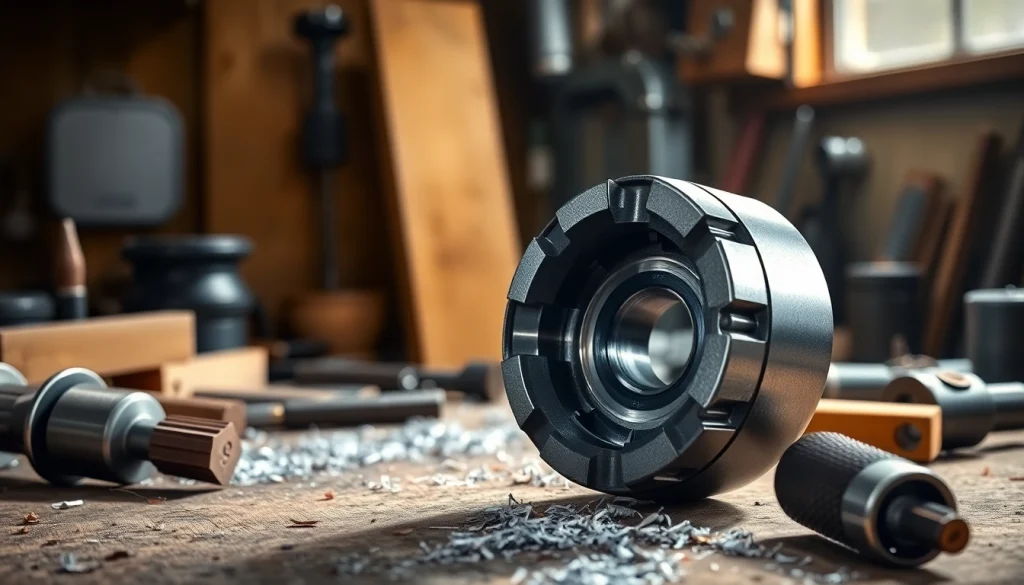Understanding Drill Chucks
1. What is a Drill Chuck?
A drill chuck is a key component of rotary tools, used to clamp and hold drill bits in place. Its primary function is to connect the drill bit to the drill’s motor, providing a secure and stable attachment that withstands the forces generated during drilling. Depending on the design, drill chucks can accommodate various sizes and types of bits, making them versatile for different applications, from wood drilling to metalworking.
2. Types of Drill Chucks Explained
Drill chucks come in several types, each tailored for specific use cases:
- Keyed Drill Chucks: These require a key to tighten or loosen the chuck, ensuring a secure grip on the drill bit. They are often used in heavy-duty applications where bit slippage is unacceptable.
- Keyless Drill Chucks: These allow for quick and easy bit changes without the need for a wrench or key, making them ideal for quick tasks and convenience.
- Hybrid Chucks: Combining features of both keyed and keyless chucks, hybrid models offer versatility and ease of use.
3. Key Features to Look For in a Drill Chuck
When selecting a drill chuck, consider the following features:
- Size Range: Ensure the chuck can accommodate the diameter of the bits you will be using.
- Construction Material: High-quality materials, such as steel, enhance durability and performance.
- Grip Mechanism: The grip strength (how tightly it holds the bit) is crucial during operation, especially under heavy loads.
- Compatibility: Check if the chuck is compatible with your drill type (corded versus cordless).
Choosing the Right Drill Chuck
1. Factors Influencing Drill Chuck Selection
Choosing the right drill chuck involves several critical factors:
- Type of Work: Heavy-duty tasks may require keyed chucks, while general DIY projects may benefit from keyless options.
- Bit Size: Smaller bits may be well-suited to keyless chucks, while larger bits may require the security of keyed chucks.
- Drill Type: Cordless drills typically favor keyless chucks for convenience, whereas corded drills may utilize keyed chucks for added stability.
2. Comparing Keyed vs. Keyless Drill Chucks
The debate between keyed and keyless chucks boils down to convenience versus security. Keyed chucks are often seen as more secure, which is advantageous for heavy machinery and precision tasks. However, keyless chucks allow for faster bit changes, making them appealing for projects that require frequent adjustments. Ultimately, the choice depends on user preference and specific project requirements.
3. Drill Chuck Sizes and Compatibility
Drill chucks come in various sizes, typically measured in inches or millimeters. The size must correspond to the drill and the bit specifications you utilize. Common sizes include 1/2”, 3/8”, and 1/4”. Additionally, compatibility with your drill’s spindle type (usually Universal or specific manufacturer mounts) is also vital to ensure proper functioning and safety.
Best Brands for Drill Chucks
1. Leading Manufacturers in the Market
Several reputable manufacturers are known for their high-quality drill chucks:
- Jacobs: Renowned for precision and durability, Jacobs offers a range of keyed and keyless chucks. Their products are often considered top-of-the-line in the industry.
- Albrecht: Famous for their precision chucks, Albrecht’s offerings ensure accuracy and superior performance, typically on the higher end of the price spectrum.
- Röhm: Combining innovation and craftsmanship, Röhm provides chucks that excel in a variety of applications.
2. User Reviews and Recommendations
When choosing a drill chuck, user reviews can offer insight into performance and reliability. Many users highlight their satisfaction with brands like Jacobs for heavy-duty applications, while others commend the convenience of keyless models from Röhm for casual DIY tasks.
3. Pricing and Quality Considerations
The price of drill chucks can vary significantly based on brand, features, and construction. While it’s tempting to choose the cheapest option, investing in a quality chuck often pays off in terms of durability, performance, and overall user satisfaction. Budgeting for a good-quality chuck is advisable, especially for professionals.
Using and Maintaining Your Drill Chuck
1. How to Properly Install a Drill Chuck
Installing a new drill chuck may seem straightforward, but following these steps ensures optimal performance:
- Turn off the drill and disconnect it from the power source.
- Use a wrench to loosen the existing chuck and remove it.
- Install the new chuck, tightening it securely.
- Reconnect your drill to the power and check that the chuck is securely attached by running it briefly without a bit.
2. Tips for Maintaining Drill Chuck Performance
To extend your drill chuck’s life and maintain performance:
- Keep the chuck clean; debris can create friction and impede performance.
- Store your drill and chuck away from direct moisture to prevent rust.
- Regularly check for wear and replace the chuck if any damage is visible.
3. Troubleshooting Common Issues
Common issues might include drill bit slippage or difficulty tightening. To troubleshoot:
- If bits slip, ensure the chuck is clean and properly tightened. Consider switching to a keyed chuck if slippage persists.
- For tight operation, apply some oil to the tightening mechanism to ensure smooth functioning.
Future Trends in Drill Chuck Technology
1. Innovations in Drill Chuck Design
Advancements in materials and technology continue to influence drill chuck design. Recent innovations include lightweight materials for ease of use and ergonomic designs for comfortable handling.
2. Impact of Technology on Performances
Modern drill chucks now incorporate smart technology to provide real-time feedback on performance, which can include monitoring torque and grip strength, further enhancing the user’s control during drilling tasks.
3. Predictions for Future Developments in Drill Chucks
The future may witness the emergence of fully automatic chucks that adjust based on the material being drilled, ensuring optimal performance without manual adjustments. As drilling technology continues to evolve, chucks will play a critical role in maximizing efficiency and accuracy in drilling operations.


